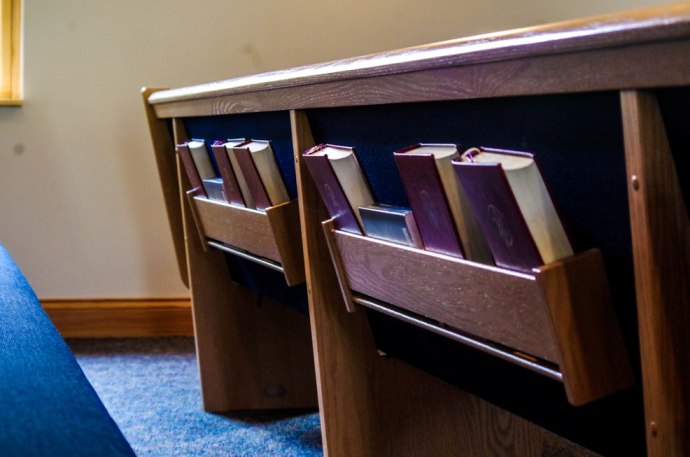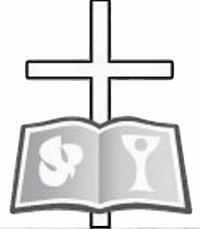
Worship Style of Abiding Word
Every church has its own style of worship. At Abiding Word, we follow an order of worship called the liturgy. The word liturgy means service. Of course, the whole life of the Christian is our liturgy–our service to the Lord. On Sunday mornings, the focus on service is two-fold.
The primary focus centers on God’s service to us through the Word (the Bible) and the sacrament (Holy Communion). Another important emphasis in the Lutheran liturgy is our service to God. We believe this two-fold emphasis goes together: our service to God is the Spirit empowered response of God’s service to us. We maintain this emphasis throughout all our worship services at Abiding Word.
We believe you will enjoy the style of worship at Abiding Word, but as in any church you should expect to take a couple of Sundays to become accustomed to our way of praising God as a family of believers.
Each week, the service is either printed entirely in the worship folder or the basic parts are printed to provide reference to our hymnal during the service. In the worship folder, the Bible readings are printed for you. You will also find a brief explanation of the worship theme for the particular Sunday. You are welcome to bring your own Bible and follow along there if you choose.
Music and singing are important parts of our worship as well. Loud or soft, in monotone or rich harmony, ancient or contemporary, all our praise is music to the Lord.
Our worship service usually includes the following parts in a variety of forms:
The Invocation
We call on the name of the true God, with the pastor typically using words like this:
In the name of the Father and of the Son and of the Holy Spirit
These words remind Christians of their baptism, where God called us to be part of his family.
The Confession of Sins
God is perfect. We are not. As we approach the Lord in worship, we sense this glaring difference between us and God. So we confess our sin to him. With humble hearts, we tell God that we have thought, said and done things that are wrong. In fact, we were born with a sinful heart. In many cases, we use these words:
Holy and merciful Father, I confess that I am by nature sinful and that I have disobeyed you in my thoughts, words, and actions. I have done what is evil and failed to do what is good. For this I deserve your punishment both now and in eternity. But I am truly sorry for my sins, and trusting in my Savior Jesus Christ, I pray: Lord, have mercy on me, a sinner.
The Announcement of Forgiveness
This announcement is the joy of the Christian’s life. For the sake of Jesus, God forgives our sins. The Lord does not condemn us for our sinful behavior. He condemned Jesus for our sins. This wonderful announcement, spoken by the pastor, is usually worded in the following way:
God, our heavenly Father, has been merciful to us and has given his only Son to be the atoning sacrifice for our sins. Therefore, as a called servant of Christ and by his authority, I forgive you all your sins in the name of the Father and of the Son and of the Holy Spirit.
The Word
This is one of the best moments in our liturgy. We have opened our lips to the Lord, confessed our sins, and received his forgiveness. Now the Lord of all creation speaks to us. God speaks to his people through his Word–the Bible–spoken by the pastor.
Each week, the pastor reads from three different places in the Bible. The first reading is typically from the Old Testament. The second reading is usually one of the letters written by an apostle of Jesus. The last reading comes from one of the four Gospels–a common name for the books that include the words and works of Jesus himself.
Typically, the pastor gives a brief introduction to the selected Bible reading that explains how the selection fits into the overall theme of the worship service.
The Sermon
The Sermon is based on one of the three Bible readings chosen for that Sunday. The sermon expounds on the meaning of the particular reading selected. It includes the two basic teachings of the Bible–the Law and the Gospel. The Law is that Word of God which shows us our sins. The Gospel is that Word of God which shows us the solution to our sinful condition.
The sermon gives instruction and encouragement for children and adults alike. Young or old, you can expect to hear about God’s guidance and his grace for dealing with life’s problems, as well as the promise of eternal life in heaven through the Savior Jesus.
Our Response to the Word
We respond with offerings and prayers to thank the Lord for the things he has promised to us. We pray for the strength to do what he has asked.
Holy Communion
Yet another high point in the worship service is the celebration of the Lord’s Supper, or Holy Communion, as it is commonly called. God has spoken to us through the words of the Bible and the words of the pastor in the sermon. Now, the Lord comes to us in a very intimate and unique way. He comes and offers us his very body and blood.
Abiding Word (and all the congregations of the Wisconsin Evangelical Lutheran Synod (WELS) and the Evangelical Lutheran Synod) practice what is called “Closed Communion.”
As Lutheran Christians, we believe the Lord’s Supper offers many blessings. We actually receive the body and blood of the Lord Jesus, along with bread and wine.
While the Lord’s Supper grants many blessings, there are warnings in Scripture against taking the Supper in an unworthy manner. (1 Corinthians 11:27-29) Before you join us at the Lord’s table we want you to fully understand what you are doing, so that you many receive this Sacrament to your benefit.
The Lord’s Supper also gives you a wonderful opportunity to make a public statement about what you believe. No one says anything, but our actions during communion send a message. The message is simply this–when we come forward for communion at Abiding Word, we are showing everyone we agree with everything Abiding Word, a member of the WELS, teaches about the Bible.
As a visitor we believe it would be unloving to ask that you express your agreement with us until you have an opportunity to learn what we believe, teach, and confess.
Please know that closed communion is not a judgment against your saving faith in Jesus as the Savior.
We want you to be united with us in our beliefs about God’s Word. We want you to enjoy the blessings the Lord’s Supper affords. So we welcome the opportunity to sit down with you and discuss our beliefs in more detail. This will allow you to see if our church truly does teach everything the Bible teaches–no more and no less (Deuteronomy 4:2).
We celebrate the Lord’s Supper every second and fourth Sunday of the month.
The Parting Blessing
The blessing of Aaron, the blessing spoken by the pastor on most Sunday’s, has been spoken over God’s people for over 3,500 years. The Lord said, “So they will put my name of [them], and I will bless them” (Numbers 6:27).
The Lord bless you and keep you.
The Lord make his face shine on you and be gracious to you.
The Lord look on you with favor and give you peace.
With God’s blessing on our minds, we are ready to face another week in the world.
Interspersed throughout the different parts of our service are opportunities to sing. We give glory to our gracious God with psalms, hymns and spiritual songs.
